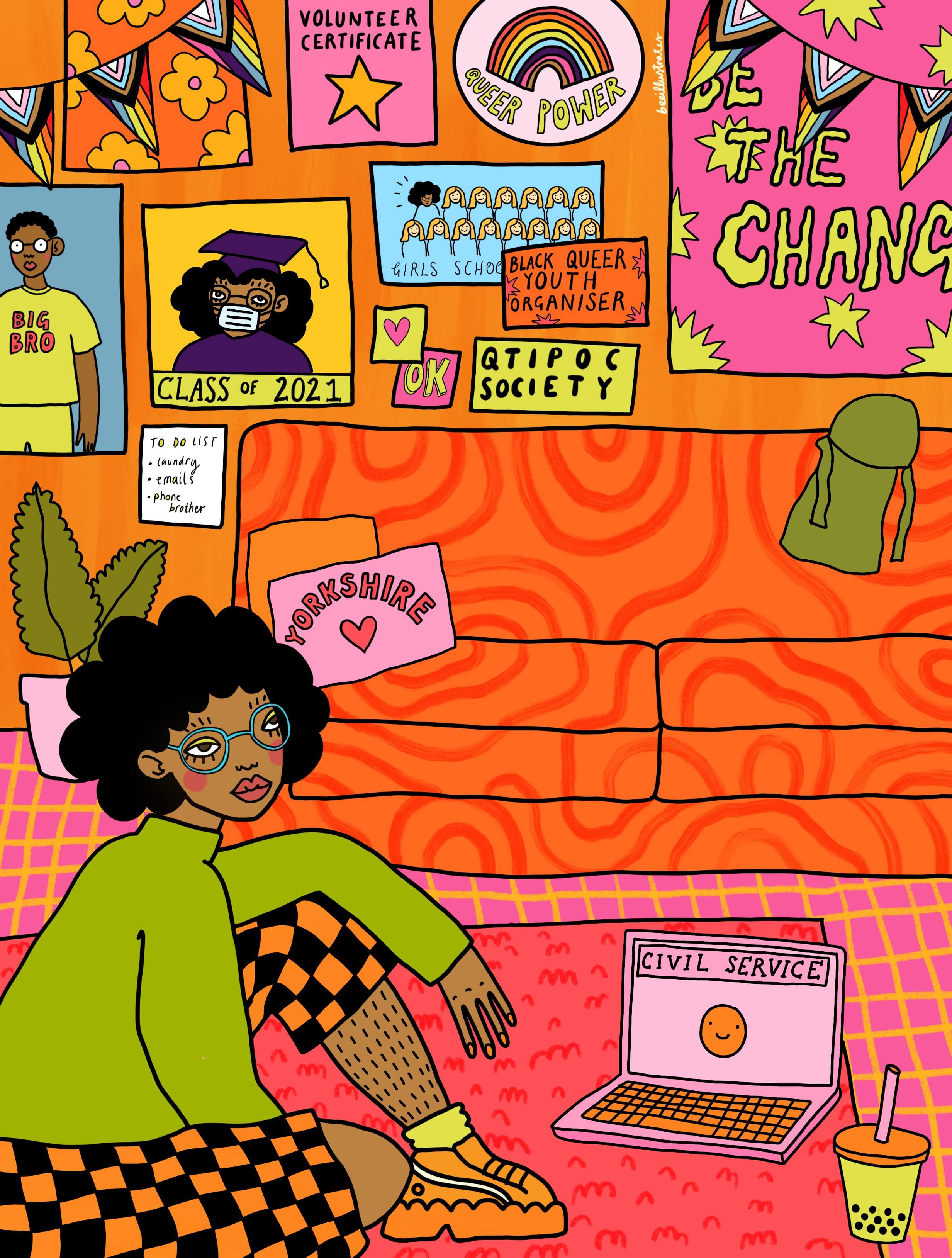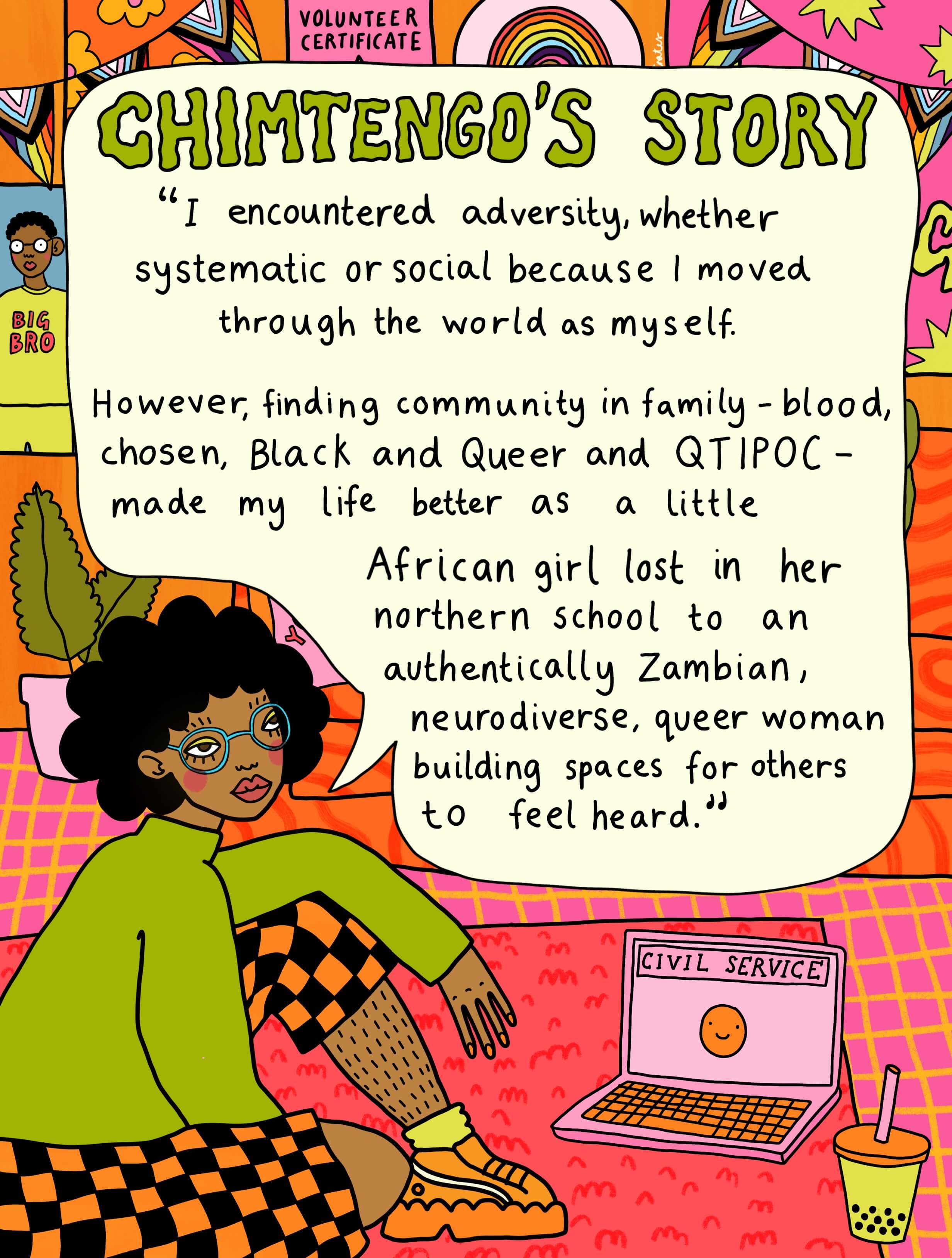
Chimtengo’s story
Discover Chimtengo’s story through school and university as a Black queer woman towards a proud, authentic future. Illustrations by Bee Illustrates @beeillustrates
Key themes: school, university, QTIPOC, discrimination, community, activism
All names and identifying details have been changed for anonymity.


Illustrations by Bee Illustrates @beeillustrates
Download an accessible image description and transcript of the text.
Interview with Chimtengo
What challenges did you face in school and university, as a Black queer young person?
I encountered many challenges at school, very similar to the ones I deal with today outside of education. The main challenges I experienced were dealing with impostor syndrome heightened by discovering my sexuality and experiencing misogynoir from my peers, teachers, lecturers, and society, along with getting accustomed to being in a predominately white secondary school and university. In secondary school, I was one of the few Black students and since coming out in Year 8, was the only queer Black student (you could even say the only LGBTQIA+ person) at that time.
At university, the same issues came about, and these became worse during COVID, because COVID emphasised the lack of social, educational, economic, political and systematic support available for Black queer young people. I dealt with mental health issues which the university had no sufficient support for, along with the lack of academic support given to final year students. This created intense feelings of isolation and loneliness but even in those moments I sought support from the community I built.
How did you overcome these challenges?
I overcame these challenges in the only way I know how to this day, and that is by finding community. I often relied on those people who understood the different intersections of my identity as separate or intertwined to support me through my challenges. For example, I often sought my siblings for advice on schoolwork and particularly my older brothers’ advice in getting involved in culture, arts and going beyond people’s expectations of what I can do as a young Black person. This support was a contributing factor to ending up in private school for sixth form. However, as many young Black queer people encounter - at that age I would not have gone to my family for support on my queerness, even if I knew they were accepting.
For my queer identity, I kind of suffered for a bit until I found other LGBQIA+ peers at school and started attending LGBTIA+ social events from local charities (which happened out of luck). As a young person in this digital age, before I came out, I also found support in online spaces or the queer representation that was out there, even with the lack of diversity, such as shows like Glee or fanfiction communities.
How have your experiences helped you think about and shape your future?
At a point in life, particularly as I started university, I became tired of existing in spaces where I felt incomplete, misunderstood, racialised, demonised and sexualised. I quickly learned that if I wanted tangible change, I had to do it myself. From then on, I carved out space for myself and the communities that meant the most to me from the age of 18 until now at 22.
I became tired of existing in spaces where I felt incomplete, misunderstood, racialised, demonised and sexualised.
These primary years I formed QTIPOC spaces and Black queer spaces, which supported my wellbeing, sense of belonging and community but also created opportunities for me to develop my aspirations and careers skills set. This led me to having a purposeful CV that I was able to use to secure my first full-time job after graduating.
What advice would you give a queer young person who is unsure about what to do with their future?
First and foremost, I would say to any queer young person who is unsure about what to do with their future: same! I still do not have a clear path of where I want to go career-wise, but I would say utilise the passions you have in figuring out what that looks like for you.
I would say to any queer young person who is unsure about what to do with their future: same!
Speak to your friends, family, and chosen family for support as you may never know if they have networks that could help you out. Depending on what stage you are in life, finding a trusted professional, whether at school, charity group you are a part of, or a university careers advisor to give you guidance is also helpful even if that’s just the start.
I would heavily encourage using the internet too! You can find opportunities or teach yourself skills for free especially in these times where money is low. For example, I found a free digital media course during covid by simply searching online.
Are you inspired by Chimtengo’s story? You can find some more information about university in our Education page. Or check out our Youth Groups page to start building a community with other LGBTQ+ young people.
Chimtengo took part in a Stonewall Young Futures focus group. Her ideas and contributions helped shape this website. Subscribe to our mailing list below to hear about opportunities to take part in our youth focus groups and have your voice heard!
- Want to be a part of Stonewall Young Futures?
-
Subscribe to our Stonewall Young Futures mailing list. We need your consent to share new content that can help you take your next step into education, training or work. We’ll also be in touch with opportunities to get involved, share your story, and give us your feedback.